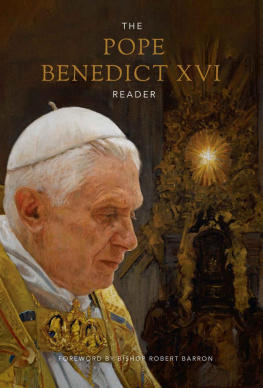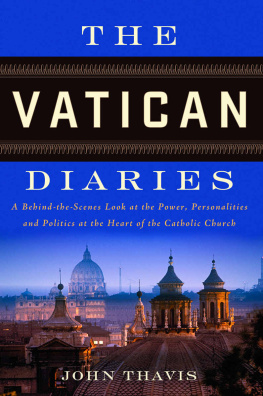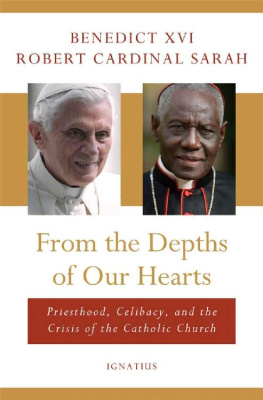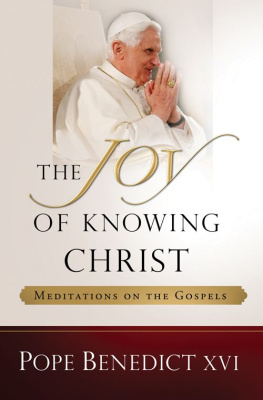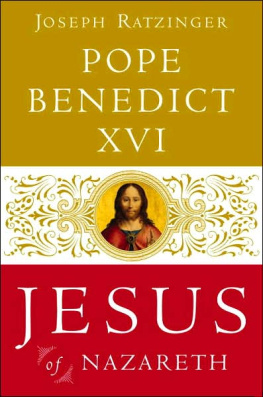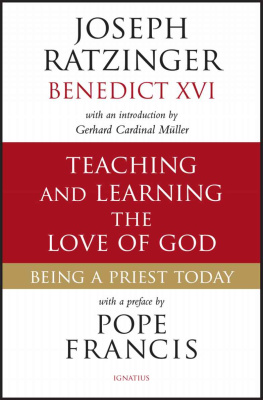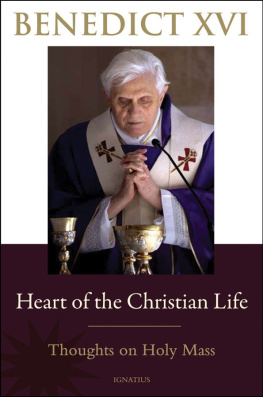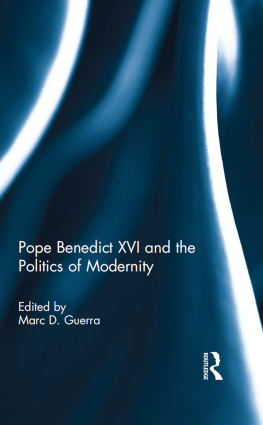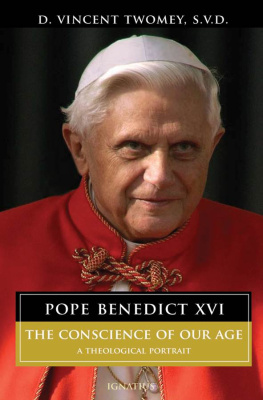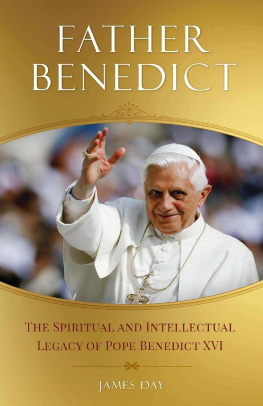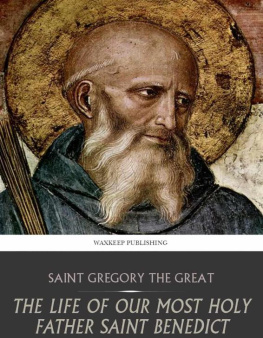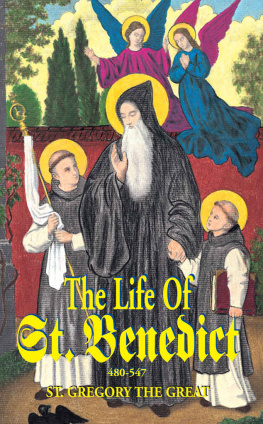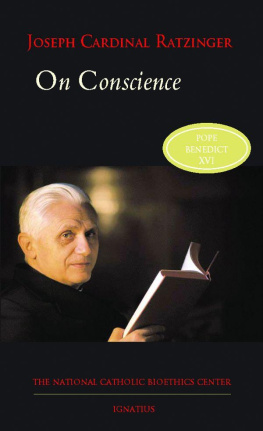Pope Benedict XVI - The Pope Benedict XVI Reader
Here you can read online Pope Benedict XVI - The Pope Benedict XVI Reader full text of the book (entire story) in english for free. Download pdf and epub, get meaning, cover and reviews about this ebook. year: 2021, publisher: Word on Fire Institute, genre: Religion. Description of the work, (preface) as well as reviews are available. Best literature library LitArk.com created for fans of good reading and offers a wide selection of genres:
Romance novel
Science fiction
Adventure
Detective
Science
History
Home and family
Prose
Art
Politics
Computer
Non-fiction
Religion
Business
Children
Humor
Choose a favorite category and find really read worthwhile books. Enjoy immersion in the world of imagination, feel the emotions of the characters or learn something new for yourself, make an fascinating discovery.
- Book:The Pope Benedict XVI Reader
- Author:
- Publisher:Word on Fire Institute
- Genre:
- Year:2021
- Rating:5 / 5
- Favourites:Add to favourites
- Your mark:
- 100
- 1
- 2
- 3
- 4
- 5
The Pope Benedict XVI Reader: summary, description and annotation
We offer to read an annotation, description, summary or preface (depends on what the author of the book "The Pope Benedict XVI Reader" wrote himself). If you haven't found the necessary information about the book — write in the comments, we will try to find it.
The Pope Benedict XVI Reader — read online for free the complete book (whole text) full work
Below is the text of the book, divided by pages. System saving the place of the last page read, allows you to conveniently read the book "The Pope Benedict XVI Reader" online for free, without having to search again every time where you left off. Put a bookmark, and you can go to the page where you finished reading at any time.
Font size:
Interval:
Bookmark:

Published by the Word on Fire Institute, an imprint of
Word on Fire, Park Ridge, IL 60068
2021 by Word on Fire Catholic Ministries
Printed in the United States of America
All rights reserved.
Excerpts collected by Daniel Seseske.
Design and layout by Anna Manhart.
Excerpts from Salt of the Earth: The Church at the End of the Millennium - An Interview with Peter Seewald (copyright 1996), used with permission of Verlagsgruppe Random House GmbH.
All rights reserved.
Excerpts from Light of the World: The Pope, the Church and the Signs of the Times
(copyright 2010) used with permission of Peter Seewald. All rights reserved.
Excerpts from Jesus of Nazareth: From the Baptism in the Jordan to the Transfiguration (copyright
2007 by Libreria Editrice Vaticana, Citta del Vaticano. Copyright, 2007 by RCS Libri S.p.A., Milan), used by permission of Doubeday Religion, an imprint of Random House,
a division of Penguin Random House LLC. All rights reserved.
Excerpts from Jesus of Nazareth: The Infancy Narratives (translation copyright 2012 by
Libreria Editrice Vaticana), used by permission of Image Books, an imprint of Random House, a division of Penguin Random House LLC. All rights reserved.
Excerpts from Daughter Zion: Meditations on the Churchs Marian Belief (copyright 1983),
The Ratzinger Report (copyright 1985), God and the World: A Conversation with Peter Seewald (copyright 2002), Introduction to Christianity, 2nd ed. (copyright 2004), Jesus of Nazareth:
Holy WeekFrom the Entrance into Jerusalem to the Resurrection (copyright 2007),
On Conscience: Two Essays by Benedict XVI (copyright 2007), The God of Jesus Christ:
Meditations on the Triune God (copyright 2008), and The Spirit of the Liturgy (copyright
2018) used with permission of Ignatius Press. All rights reserved.
Excerpts from Last Testament: In His Own Words (copyright 2017) used with permission
of Continuum, an imprint of Bloomsbury Publishing Plc. All rights reserved.
Excerpts from papal texts, including encyclicals, exhortations, audiences, homilies, and
speeches, and Many Religions One Covenant: Israel, the Church, and the World (copyright
1999) used with permission of Libreria Editrice Vaticana. All rights reserved.
All efforts have been made to contact copyright holders
for other excerpts to secure permission.
24 23 22 21 1 2 3 4
ISBN: 978-1-943243-75-4
Library of Congress Control Number: 2020925449
Contents
Y
Foreword
by Bishop Robert Barron
Y
Joseph Ratzinger (Pope Benedict XVI) is, quite simply, one of the three or four most important Catholics of the last hundred and fifty years. As a theologian, he ranks with the greatest Christian intellects of the age: Karl Barth, Karl Rahner, Hans Urs von Balthasar, and Henri de Lubac. But he was also a churchman of extraordinary influence, serving as Archbishop of Munich and Freising, and then, for twenty-three years, as Prefect of the Congregation for the Doctrine of the Faith under Pope St. John Paul II, and finally, for eight years as the successor of Peter. In these properly ecclesial roles, he had an almost unparalleled impact on the life of the Church in Europe and around the world. Since he wrote and spoke on such an extraordinary number of topics in the course of a long careerGod, Jesus Christ, the Church, liturgy, anthropology, faith and culture, eschatology, etc.it is perhaps difficult to gain an adequate appreciation of his thought.
This collection of Ratzingers writings, from across many years and on a range of themes, is meant to give an overview of his thought to those already acquainted with it and an introduction to those unfamiliar with it. If I were to characterize the life and work of Ratzinger, I would propose these four fundamental themes: he was a man of the Scriptures, a man of the Church Fathers, a man of the Second Vatican Council, and a man of the liturgy. I should like to make just a few simple observations about each of these.
Joseph Ratzinger came of age theologically in the forties and fifties of the last centurywhich is to say, at the high-water mark of the so-called ressourcement (return to the sources) movement. Weary of the somewhat tired scholasticism that dominated Catholic education and of the endless sniping wars between Protestants and Catholics, the leaders of this school of thought, figures such as de Lubac, Jean Danilou, and Yves Congar, endeavored to recover the great sources from which all of Christian theology flowsnamely, the writings of the Church Fathers and the Scriptures themselves. Throughout his career, Ratzinger tended away from the rationalism of the scholastics and leaned toward the lyricism of the Bible. This scriptural orientation came to full expression in one of the last works that he producednamely, the magnificent three-volume study of Jesus of Nazareth that he wrote while pope. To understand his biblical method, I would especially recommend a careful reading of the passage in this collection in which Pope Benedict discusses the limitations of the historical-critical approach to reading the Bible.
The second source was no less significant for Ratzinger, for throughout his life, he remained a devotee of the Fathers of the Church, especially of St. Augustine, whom he humbly claimed as his master. From this great theologian of the Western tradition, he learned to read history in a consistently God-centered manner, and from Augustines patristic colleagues, he learned the deep integration of theological reflection, biblical inspiration, and personal spirituality. Two of the clearest indications of Ratzingers patristic formation are his doctoral dissertation on Augustines notion of the Church as the house of God and his follow-up Habilitationsschrift on St. Bonaventures theology of history, which was profoundly marked by patristic thought. But the beautifully crafted and deceptively simple reflections on the Fathers that Pope Benedict gave as Wednesday audience talks during his papacymany of which are featured in this collectionare perhaps the best introduction to his patristic manner of thinking. I had the very special privilege of hearing a number of these talks in person while I was in Rome as a visiting scholar.
Ratzinger was also a man of the Second Vatican Council. Arriving in Rome in the fall of 1962 as a theological advisor to Cardinal Josef Frings of Cologne, he was, along with Hans Kng, the youngest of the periti at the council. During the four sessions of Vatican II, Ratzinger was remarkably active and productive, composing speeches for Frings, editing many of the major conciliar texts, dialoguing with theologians across the ideological spectrum, and helping to explain the determinations of the council fathers to the outside world. In the years after the close of Vatican II, Ratzinger continued to celebrate the achievements of the council in regard to liturgy, ecclesiology, the universal call to holiness, the biblical revival, and the role of the Church in the modern world. Along with Balthasar and de Lubac, he strongly resisted what he took to be a liberal attempt to hijack the council and turn it into a vehicle for the radical transformation of the Church. Thus, from 1965 through the years of his papacy, Ratzinger defended what he called a hermeneutic of continuity, according to which Vatican II represented indeed a development of doctrine, but not a rupture with the past. At the same time, like John Paul II, he stood against that traditionalist interpretation which would see the council as simply a betrayal of the Catholic tradition. He saw his work, both under John Paul II and in his own right as pope, as giving a definitive interpretation to Vatican II, one that would hold off the extremism of both left and right. A number of speeches, interviews, and essays in the present volume vividly present this aspect of Ratzingers work.
Font size:
Interval:
Bookmark:
Similar books «The Pope Benedict XVI Reader»
Look at similar books to The Pope Benedict XVI Reader. We have selected literature similar in name and meaning in the hope of providing readers with more options to find new, interesting, not yet read works.
Discussion, reviews of the book The Pope Benedict XVI Reader and just readers' own opinions. Leave your comments, write what you think about the work, its meaning or the main characters. Specify what exactly you liked and what you didn't like, and why you think so.

